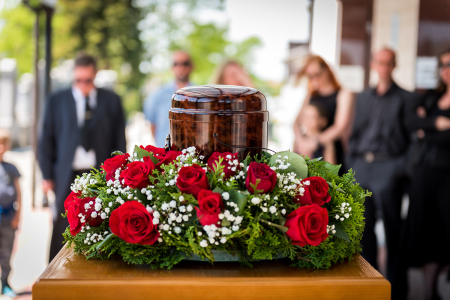As fewer Americans identify as Christian, funeral industry says demand for cremation is on the rise

The head of the National Funeral Directors Association (NFDA), which claims to be the world’s largest association of funeral professionals, says traditional burials are less popular and the demand for cremation is on the rise.
The reason? According to NFDA President Jack Mitchell, it’s because fewer Americans are likely to be churchgoers.
"Traditionally when someone lost a loved one, they would have a viewing and then they would be taken to their church for a funeral service and then onto the cemetery for a burial," Mitchell told Business Insider earlier this month. "But more and more people don't go to church, so a religious aspect to however they memorialize their loved one is not important to them.
Even amid an ongoing decline in church attendance post-COVID, an NFDA report released last August stated that cremation gained more mainstream acceptance after pandemic restrictions imposed by state and local governments forced families who lost loved ones to improvise.
According to the NFDA, 41% of funeral home clients chose direct cremation, while another 35% chose cremation along with a memorial service. Less than a quarter of funeral home clients chose a casketed adult funeral with viewing and cremation, according to the report.
By 2035, the trade group projects the cremation rate for all 50 U.S. states will exceed 50%.
Those numbers dovetail with a report released in January which found that the COVID-19 pandemic and ongoing lockdowns accelerated a steep decline in church attendance, particularly among young people.
And as fewer Americans identify with the Christian faith, the demand for traditional burial ceremonies is also expected to decline.
“So that brings up then, 'Do we need to have mom in a casket?’” said Mitchell. “We're not going to be taking her to church. Is cremation a possibility?'"
While there are nearly 100 verses in Scripture that speak to the practice of burying the dead, inflation has fueled a sharp rise in the cost of a traditional burial, with an average cremation service typically costing about 40% less than funerals with burials, said Mitchell.
The soaring cost has caught the attention of federal regulators: in May, the Federal Trade Commission announced it will consider making changes to the “Funeral Rule,” a 40-year-old policy that requires funeral homes to disclose their pricing to prospective clients.
As the death industry deals with changing demographics and higher prices, more states are looking to alternatives to traditional burials, including the state of California, which passed a law last November to allow human cadavers to potentially be used as garden soil in growing food for human consumption.
Assembly Bill 351, known as The Cemetery and Funeral Act, establishes a framework to license and regulate a process for cemeteries and other similar facilities in which dead human bodies are converted into soil.
The California Catholic Conference of Bishops (CCC) was among several groups that stood in opposition to AB 351, saying the process "reduces the human body to simply a disposable commodity."
In a statement provided to The Christian Post, CCC Executive Director Kathleen Domingo warned that beyond theological considerations, there are ethical issues as well, namely the use of human remains treated as a "mass grave."
"Dispersing the remains in public locations, without an advisory to members of the public, risks people treading over human remains without their knowledge while repeated dispersions in the same area are tantamount to a mass grave," said Domingo.





















